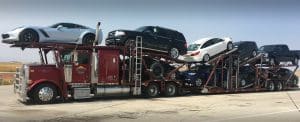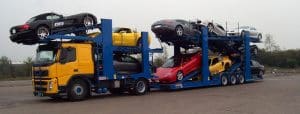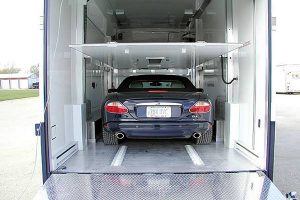Introduction To Car Transport Methods
When it comes to transporting a vehicle, whether for a cross-country move, purchasing a car from another state, or sending a prized classic to a car show, choosing the right method of transport is crucial. Car transport services offer two main options: enclosed and open car transport. Each method has its distinct advantages and considerations, making it essential for vehicle owners to understand the differences before making an informed decision.
Open car transport is the more commonly used and widely recognized method. It involves loading vehicles onto an open trailer that can carry multiple cars at once. This type of transport is often seen on highways and offers a cost-effective solution for moving vehicles over long distances. The primary advantage of open transport is its affordability; because multiple cars are transported simultaneously, the per-vehicle cost decreases significantly.
However, this method does expose vehicles to weather elements and road debris since they are not enclosed within the trailer.
On the other hand, enclosed car transport provides a higher level of protection by placing vehicles inside fully covered trailers. This option is particularly appealing for high-value cars such as luxury models, antiques, or custom-built automobiles that require extra care during transit. Enclosed trailers shield vehicles from external conditions like rain, snow, dust, and potential damage from road debris. While offering superior protection and peace of mind for vehicle owners concerned about their car’s pristine condition upon arrival at its destination, enclosed transport tends to be more expensive due to its added security features.
Understanding these foundational aspects of both enclosed and open car transport methods allows vehicle owners to weigh their priorities—be it budget constraints or the need for maximum protection—when selecting how best to move their valuable asset from one location to another.
What Is Open Car Transport?
Open car transport is the most common and widely used method for shipping vehicles across both short and long distances. This approach involves loading cars onto a multi-level, open-air trailer, similar to the ones often seen delivering new cars to dealerships. These trailers can typically carry between 7 to 10 vehicles at a time, depending on their size and weight.
The primary appeal of open car transport lies in its cost-effectiveness. Because these trailers can accommodate several vehicles simultaneously, the overall transportation costs are spread out among multiple customers. This makes it an economical choice for those looking to ship their cars without breaking the bank. Additionally, because it’s such a prevalent method, finding an available slot on an open carrier is generally easier compared to enclosed transport options.
However, there are trade-offs associated with this affordability. The most significant concern is exposure to external elements. Vehicles transported via open carriers are subjected to weather conditions such as rain, snow, and hail, as well as road debris like dust and gravel. While this might sound alarming, it’s worth noting that instances of significant damage during transport are relatively rare.
Another consideration is security; because the vehicles are visible and accessible on open carriers, they could potentially be at higher risk for vandalism or theft compared to enclosed transport methods. Nonetheless, reputable transport companies often take extensive measures to mitigate these risks through robust insurance policies and secure loading practices.
In summary, open car transport offers a budget-friendly solution for vehicle shipping needs while balancing efficiency with certain risks related to environmental exposure and security concerns. It’s particularly suitable for standard consumer vehicles where affordability outweighs the need for extra protection during transit.
Benefits Of Open Car Transport
Open car transport is a widely utilized method for shipping vehicles, offering several distinct advantages that make it an attractive option for many individuals and businesses. One of the primary benefits of open car transport is its cost-effectiveness. Because open carriers can transport multiple vehicles simultaneously—often up to ten cars on a single trip—the costs are distributed among several customers, resulting in lower individual expenses compared to enclosed transport options.
This makes open car transport particularly appealing to budget-conscious consumers who need reliable vehicle shipping without incurring high costs.
Another significant advantage is the availability and convenience associated with open car transport. Due to its popularity, there are more open carriers on the road than enclosed ones, which means greater flexibility when it comes to scheduling pick-up and delivery dates. This increased availability can lead to shorter wait times and more efficient service overall, ensuring that vehicles reach their destinations in a timely manner.
Additionally, open car transport provides transparency during transit. Since the vehicles are transported on an open trailer, they are visible at all times. This visibility allows for easy inspection of the cars upon arrival, giving owners peace of mind that their vehicle has been handled with care throughout the journey. Any potential damage or issues can be quickly identified and addressed immediately upon delivery.
Furthermore, modern advancements in logistics have enhanced the safety measures employed by open carriers. Vehicles are securely fastened using state-of-the-art equipment to minimize movement during transit. While exposure to weather elements and road debris remains a consideration, reputable companies take precautions such as regular maintenance checks on their trailers and experienced drivers who follow best practices for securing loads.
In summary, open car transport offers numerous benefits including cost savings, wide availability, transparency during transit, and enhanced safety measures—all contributing factors that make it a practical choice for many vehicle owners seeking efficient transportation solutions.
What Is Enclosed Car Transport?
Enclosed car transport is a specialized service designed to provide maximum protection for vehicles during transit. Unlike open car transport, where cars are exposed to the elements and potential road debris, enclosed car transport involves shipping vehicles in a fully covered trailer. This method is particularly favored for transporting high-value, classic, luxury, or exotic cars that require extra care.
The primary advantage of enclosed car transport lies in its ability to shield vehicles from external factors. Weather conditions such as rain, snow, hail, and extreme sun can cause damage or wear to a vehicle’s exterior and interior over time. Enclosed trailers offer an impenetrable barrier against these elements, ensuring that the transported vehicle arrives at its destination in pristine condition.
Security is another significant benefit of enclosed car transport. Vehicles inside an enclosed trailer are less visible to prying eyes and potential thieves. This added layer of protection is crucial when transporting rare or valuable cars that might attract unwanted attention if left exposed on an open carrier.
Moreover, enclosed car carriers often come equipped with advanced features like hydraulic lift gates and specialized tie-down systems. These tools facilitate gentle loading and unloading processes while securely fastening the vehicle in place during transit. Such measures minimize the risk of scratches, dents, or other forms of physical damage.
Enclosed carriers generally offer lower capacity than their open counterparts—typically accommodating two to six vehicles rather than eight to ten—allowing for more personalized service and less handling of each individual car. While this premium service comes at a higher cost compared to open transport options, many owners find it well worth the investment given the added peace of mind it provides.
In summary, enclosed car transport represents an elite level of auto shipping designed for those who prioritize safety and security above all else when moving their prized possessions from one location to another.
Advantages Of Enclosed Car Transport
Enclosed car transport offers several compelling advantages over its open counterpart, making it a preferred choice for many vehicle owners, particularly those with high-value or classic cars. One of the primary benefits is the superior protection it provides. Vehicles transported in an enclosed carrier are shielded from external elements such as harsh weather conditions, road debris, and potential damage from insects or bird droppings.
This level of protection is especially critical for luxury, antique, or exotic cars that require meticulous care to maintain their pristine condition.
Another significant advantage is enhanced security. Enclosed carriers generally offer better protection against theft and vandalism compared to open trailers. The vehicles are not visible to passersby during transit, reducing the risk of attracting unwanted attention. This added layer of security can be crucial when transporting rare or highly valuable cars.
Moreover, enclosed transport often includes additional services such as hydraulic lift gates and soft tie-downs which ensure that vehicles are loaded and unloaded with utmost care. These features minimize the risk of scratches or mechanical damage that could occur during handling. For owners who have invested considerable time and money into their vehicles, this peace of mind is invaluable.
The service quality associated with enclosed car transport is typically higher as well. Transport companies offering enclosed options often employ drivers who have specialized training in handling high-end vehicles. They are more likely to understand the nuances involved in transporting delicate automobiles safely.
While it’s true that enclosed car transport tends to be more expensive than open transport, many vehicle owners find that the added cost is justified by the superior protection and service quality offered. For those looking to ensure their prized possessions reach their destination in perfect condition, enclosed car transport stands out as a prudent investment.
Cost Comparison: Open Vs Enclosed Car Transport
When considering the cost of transporting a vehicle, the choice between open and enclosed car transport plays a significant role. Open car transport is generally the more economical option, appealing to budget-conscious customers. This method involves loading vehicles onto an open-air carrier, which can typically accommodate up to ten cars. The efficiency and higher capacity of these carriers translate into lower costs per vehicle, making it an attractive choice for many.
However, the affordability of open car transport comes with certain trade-offs. Vehicles on open carriers are exposed to weather elements such as rain, snow, and hail, as well as road debris and potential damage from other vehicles on the carrier. While instances of significant damage are relatively rare due to industry-standard securing methods and experienced drivers, the risk is nonetheless higher compared to enclosed transport.
Enclosed car transport offers heightened protection at a premium price. This method involves transporting vehicles in an enclosed trailer that shields them from external elements and road hazards. Enclosed carriers usually hold fewer cars—often between two to six—resulting in higher individual transportation costs due to lower capacity and increased labor intensity.
The added expense of enclosed transport is frequently justified for high-value vehicles such as luxury cars, classic models, or exotic automobiles where exposure could result in costly repairs or diminished value. Insurance coverage also tends to be more comprehensive with enclosed transport services because the likelihood of damage is minimized.
Ultimately, the decision between open and enclosed car transport hinges on weighing cost against risk tolerance and vehicle value. For everyday cars or those less susceptible to depreciation from minor cosmetic damages, open car transport remains a practical choice. Conversely, for owners seeking maximum protection for valuable investments during transit, the additional cost of enclosed car transport provides peace of mind that many find worthwhile.
Choosing The Right Option For Your Needs
Choosing the right option between enclosed car transport and open car transport hinges on a variety of factors that cater to your specific needs and circumstances. Understanding these factors can help you make an informed decision that ensures the safety, cost-effectiveness, and convenience of your vehicle’s transportation.
The primary consideration often revolves around the value and condition of your vehicle. Enclosed car transport is typically the preferred choice for luxury cars, classic automobiles, or any vehicle with significant sentimental or financial value. This method offers superior protection against weather elements, road debris, and potential damage during transit. If your car has a pristine paint job or delicate parts that could be compromised by external conditions, an enclosed carrier provides peace of mind through its protective barriers.
Conversely, open car transport is generally more economical and widely accessible. It is a popular option for standard vehicles that do not require extra shielding from environmental factors. While open carriers expose cars to the elements and potential road hazards, they are highly efficient for short distances or when transporting multiple vehicles at once. For many everyday drivers looking to move their cars without incurring substantial costs, this method strikes a practical balance between affordability and reliability.
Another aspect to consider is timing and availability. Enclosed trailers are less common than their open counterparts; therefore, booking an enclosed service might require more advanced planning due to limited availability. Open carriers tend to offer more flexibility with scheduling because they are more frequently used in the industry.
Ultimately, choosing between enclosed and open car transport comes down to evaluating what matters most for you: cost versus protection. By assessing your vehicle’s specific needs alongside budget constraints and logistical considerations, you can select a transportation method that aligns perfectly with your requirements while ensuring a seamless relocation process for your prized possession.








